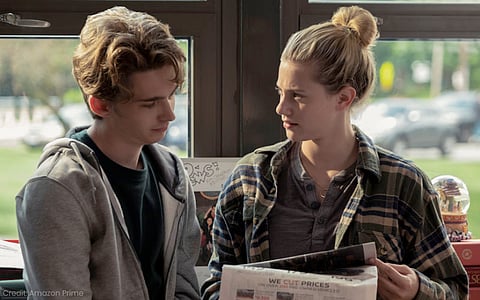
- Reviews
- Power List 2024
- Cannes 2024
- In-Depth Stories
- Web Stories
- News
- FC Lists
- Interviews
- Features
- FC SpecialsFC Specials

Kintsugi is a traditional Japanese art form that refers to the process of mending broken pottery by lacing the areas of its breakage with a lacquer mixed with gold paint. Thanks to the internet, it has become one of the favourite metaphors among the millennials about fixing broken things and finding beauty in broken objects. This internet obsession is taken too seriously and too far by Chemical Hearts, an American teenage drama starring Lili Reinhart and Austin Abrams that was released in 2020 by Amazon Studios. It is based on the bestselling novel, Our Chemical Hearts, written by Krystal Sutherland.
The movie introduces us to a "hopeless romantic" teenager, Henry Page (Abrams) who spends his time breaking pottery: we literally see him smashing a vase gifted to him by his parents on his birthday and practising kintsugi on them. He has a shelf full of these fixed vases and his elder sister rightly points out that it is an "odd hobby" for a 17-year old boy. He joins as the editor of the school magazine and steadily falls in love with a new student, Grace Town (Reinhart). She has been in an unfortunate accident that has led to the loss of her ex-boyfriend Dom's life and left her with a knee injury. She walks with the help of a stick. She calls herself "the most confused person" – a confusion that copious amounts of grief, her physical disability and her new romantic interest, Henry, might have thrust her into. An unlikely romantic attraction begins to develop between Henry and Grace from the moment they share 'Love Sonnet XVII' by Pablo Neruda.
The implication of brokenness is too apparent in Grace's character – both because of her past as well as her disability. While Henry is curious about her at first, we see him softening towards her as he discovers more about her life and the unfortunate accident she was in. It is difficult to believe in the emotions in the words "I love you" when he says them to Grace. Henry suffers from the temptation of the messiah complex because of his unusual hobby, and it reflects in his behaviour. He is attracted to Grace, sure, but love? The audience might consider pondering this. In fact, to not lead the audience into reading the metaphor of kintsugi into the relationship of the two teenagers, and therefore maintain political correctness, we find Grace angrily rebuking Henry for treating her like one of his vases on two occasions in the film. Of course, we should not miss out on the highlighted lines from Neruda's poem itself, "I love you as certain dark things are supposed to be loved,/in secret, between the shadow and the soul…", which go on to define the terms of romantic attraction that Henry feels towards Grace. If read between the lines here in the context of the film, the love idolised is flawed for trying to grasp at the unlovable and making it less 'dark' by showering affections.
This metaphor of fixing broken things, of kintsugi, is particularly problematic because, in the 21st century, we should neither indulge nor teach teenagers to indulge in the idea that a disabled person or a person with a difficult past needs to be fixed. The film does not set out to preach this idea but it certainly gives into it because of the actions of the protagonist, Henry. Chemical Hearts risks portraying the complex terrain of a rebound relationship but, just like one of Henry's vases, it breaks because of the lack of in-depth understanding of the "teenage limbo". Even in one of the final scenes of the movie as Henry's voiceover informs the audience that scars are not reminders of brokenness but of a new creation, a romanticisation of scars continues to persist. We still see him fixing his broken vase using kintsugi, surrounded by his other kintsugi creations.
Chemical Hearts, directed by Richard Tanne, mostly finds itself sinking under the weight of the joyless, cloudy setting and the perpetually cheerless teenagers, but what strikes me as most problematic is the metaphor of kintsugi that – and it is high time – needs to stop being romanticised as a life lesson among millennials either in popular culture or on the web.